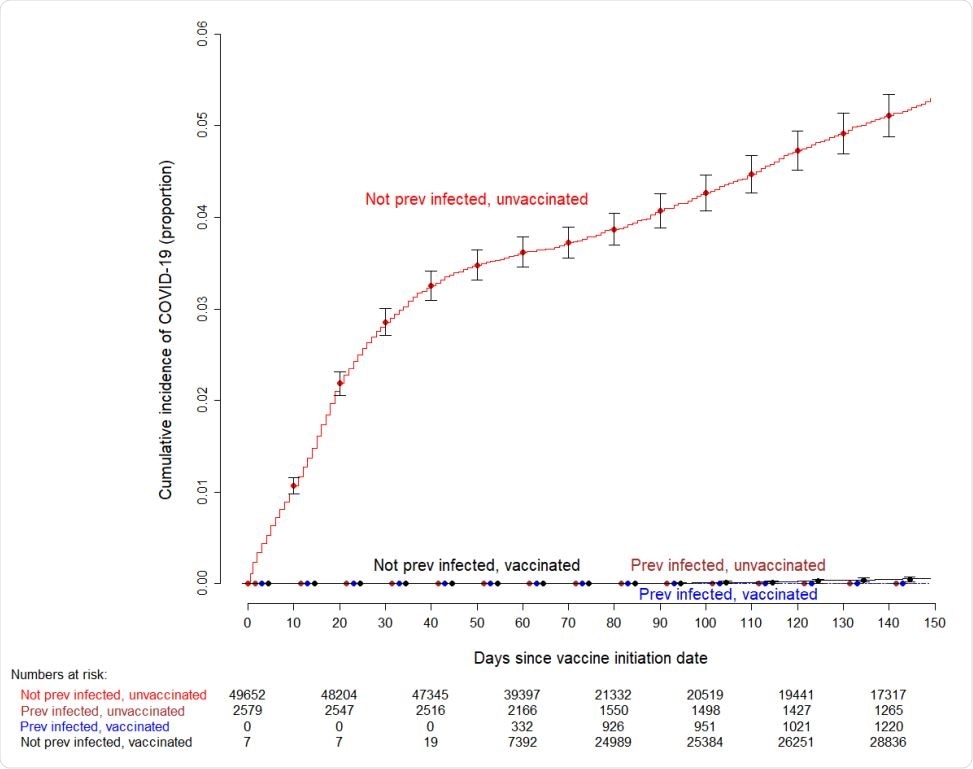Scientists from the Cleveland Clinic, USA, have recently evaluated the effectiveness of coronavirus disease 2019 COVID-19) vaccination among individuals with or without a history of severe acute respiratory syndrome coronavirus 2 (SARS-CoV-2) infection.
The study findings reveal that individuals with previous SARS-CoV-2 infection do not get additional benefits from vaccination, indicating that COVID-19 vaccines should be prioritized to individuals without prior infection. The study is currently available on the medRxiv* preprint server.
.jpg)
Background
In the United States, the US Food and Drug Administration (FDA) has approved two mRNA-based COVID-19 vaccines developed by Pfizer/BioNTech and Moderna, which have shown high efficacy against SARS-CoV-2 infection and COVID-19 disease in clinical trials. However, the ability to vaccinate a large part of the global population is limited by vaccine supply.
In order to ensure fair access to vaccines throughout the world, the COVID-19 vaccines Global Access (COVAX) initiative was launched. In many countries, especially those with low socioeconomic status, there is a serious shortage of vaccines. Thus, in order to get the maximum vaccine benefits, the most vulnerable population should be prioritized for the vaccination.
Currently, most countries prioritize vaccination for healthcare and other frontline workers, elderly people, and people with comorbidities.
To further narrow down the prioritization criteria, the scientists in the current study have evaluated the necessity of COVID-19 vaccines for individuals who were previously infected with SARS-CoV-2.

Study design
The study was conducted on 52,238 employees in the Cleveland Clinic. A positive RT-PCR test was considered to define SARS-CoV-2 infection. The participants received two doses of the Pfizer/BioNTech or Moderna COVID-19 vaccine at an interval of 28 days. A participant was considered vaccinated after 14 days of receiving the 2nd vaccine dose. Similarly, a participant who tested positive for SARS-CoV-2 at least 42 days before the vaccination initiation was considered previously infected.
Important observations
Of all enrolled participants, 5% had previous SARS-CoV-2 infection. Compared to 59% of non-infected participants, only 47% of previously infected participants were vaccinated by the end of the study. About 63% of all vaccinated participants received the Moderna vaccine.
The analysis of cumulative COVID-19 incidence revealed that during the course of the study, SARS-CoV-2 infection occurred almost exclusively in participants who were not previously infected and were not vaccinated.
Interestingly, no significant difference in COVID-19 incidence was observed between previously infected and currently unvaccinated participants, previously infected and currently vaccinated participants, and previously uninfected and currently vaccinated participants.
The participants from these three groups exhibited a significantly lower incidence of SARS-CoV-2 infection compared to previously uninfected and currently unvaccinated participants.
Specifically, of all infections during the study period, 99.3% occurred in participants who were not infected previously and remained unvaccinated. In contrast, only 0.7% of infections occurred in participants who were not previously infected but were currently vaccinated.
Importantly, not a single incidence of SARS-CoV-2 infection was observed in previously infected participants with or without vaccination.

With further statistical analysis, it was observed that the COVID-19 vaccination significantly reduced the risk of SARS-CoV-2 infection in previously uninfected participants but not in previously infected participants.
Although the study did not directly estimate the duration of protection from natural infection, it was observed that previously infected participants remained protected against COVID-19 for at least 10 months after the symptom onset or a positive test result.
Study significance
The study findings reveal that individuals who previously had symptomatic COVID-19 are less likely to get additional benefits from vaccination.
In contrast, individuals without prior SARS-CoV-2 infection can get the maximum benefits from vaccination. Thus, based on the study findings, COVID-19 vaccines should be prioritized to naïve individuals without a history of SARS-CoV-2 infection.
*Important Notice
medRxiv publishes preliminary scientific reports that are not peer-reviewed and, therefore, should not be regarded as conclusive, guide clinical practice/health-related behavior, or treated as established information.
- Shrestha NK. 2021. Necessity of COVID-19 Vaccination in Previously Infected Individuals: A Retrospective Cohort Study. medRxiv. https://www.medrxiv.org/content/10.1101/2021.06.01.21258176v2
Posted in: Child Health News | Men's Health News | Medical Research News | Women's Health News | Disease/Infection News
Tags: Coronavirus, Coronavirus Disease COVID-19, Efficacy, Healthcare, Respiratory, SARS, SARS-CoV-2, Severe Acute Respiratory, Severe Acute Respiratory Syndrome, Syndrome, Vaccine

Written by
Dr. Sanchari Sinha Dutta
Dr. Sanchari Sinha Dutta is a science communicator who believes in spreading the power of science in every corner of the world. She has a Bachelor of Science (B.Sc.) degree and a Master's of Science (M.Sc.) in biology and human physiology. Following her Master's degree, Sanchari went on to study a Ph.D. in human physiology. She has authored more than 10 original research articles, all of which have been published in world renowned international journals.
Source: Read Full Article
